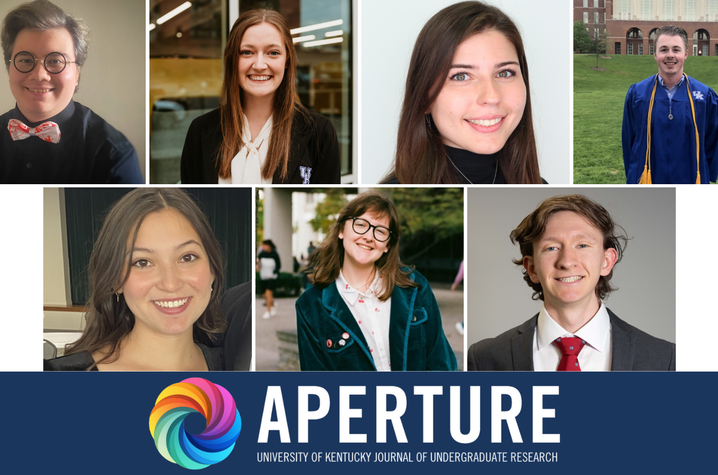Students launch UK’s 1st edition of undergraduate research journal

Undergraduate students at the University of Kentucky who participate in research under the guidance of faculty mentors now have the opportunity to publish and broadly share the outcomes of their work and collaborative experiences. The inaugural edition of Aperture Journal of Undergraduate Research (AJUR) launched June 1, highlighting seven student-professor partnerships.
Published by the Office of Undergraduate Research (OUR), the open-access, peer- and expert-reviewed journal — which will be published annually — aims to showcase the rich and diverse scholarship conducted by UK undergraduates and promote the advancement of knowledge by publishing reports of their unique experiential endeavors.
“Aperture presents a distinct avenue for undergraduate researchers and their mentors to share the outcomes of the research endeavors to the UK community and, given the digital format, across the globe,” said Chad Risko, OUR faculty director and associate professor of chemistry.
Founded in June 2023 and supported by OUR, AJUR is an entirely student-led organization dedicated to promoting a culture of curiosity. From branding to intellectual property and recruitment, the AJUR student launch team met weekly and invested hundreds of hours to establish a sustainable undergraduate research journal.
“I have learned so much through the process of launching Aperture,” said Ashbey Manning, a 2024 chemical and biopharmaceutical engineering graduate in the UK Stanley and Karen Pigman College of Engineering and co-editor-in-chief. “One thing I didn’t expect to learn so much about were the legal and intellectual property concerns when launching a new journal. Going through all of the appropriate channels really helped to lay the foundation for a sustainable journal.”
Aside from the executive editorial board, Aperture includes four student committees focused on design, marketing and outreach, editorial review, and publication and production. Undergraduates with strong writing skills and an interest in editing and publishing are invited to join the Student Editorial Board. Joining the board offers students opportunities to learn firsthand about producing an online research journal. Learn more about joining the editorial board and committees here.
The projects included in AJUR’s inaugural edition are:
- Simon Boone, 2024 psychology graduate; Mentor: Rachel Farr, Ph.D., College of Arts and Sciences. Project: “Salient Identity Development & Expression Among Diverse Adopted Adolescents.”
- Riley Droppleman, 2024 biology and English and Lewis Honors College graduate; Mentor: Michelle Sizemore, Ph.D., College of Arts and Sciences. Project: " “‘Terror had exterminated all the sentiments of nature’: Disease and Disruption in Charles Brockden Brown’s ‘Arthur Mervyn; or, Memoirs of the Year 1793’ and the Pandemic Fiction Novel.”
- Joshua Hinton, 2024 English and political science graduate; Mentor: Michelle Sizemore, Ph.D., College of Arts and Sciences. Project: “Tobacco Farming in Appalachia and Demon Copperhead.”
- Samuel LeRose, physics senior; Mentor: Christopher Crawford, Ph.D., College of Arts and Sciences. Project: “Design and Implementation of Digital Logic Filtration on Open-Source Field-Programmable Gate Arrays.”
- Johnna Warkentine, linguistics senior; Mentor: Molly Blasing, Ph.D., College of Arts and Sciences. Project: “The Persistence of Memory in Other Mediums: Creating a Digital Audio Archive of Anastasia Tsvetaeva.”
- Sophie Wingo, art history and visual studies and Spanish major; Mentor: Anna Brzyski, Ph.D., College of Fine Arts. Project: “‘You ought to see the corridas!’: Normalizing the Franco Regime in the 1960s through Tourism Promotion.”
- Caroline Youdes, 2024 biology and Lewis Honors College graduate; Mentor: Anthony Bardo, Ph.D., College of Arts and Sciences. Project: “The Fall of Enicidem - A Fairytale & Satire of America’s Response to the Opioid Epidemic.”
Each submission goes through five stages of review. Initially, the student’s adviser or principal investigator reviews and approves the paper. Then it goes to the Office of Technology Commercialization’s legal team for review and approval.
Next, Aperture’s editorial team assesses the submission to ensure adherence to the journal’s submission guidelines, meticulously checking for errors or inconsistencies. The fourth stage involves a thorough review by graduate students or faculty advisers specializing in the specific research field under discussion.
The final phase of the review process occurs as the editorial team revisits the revised paper, confirming that all necessary changes have been incorporated and ensuring the article is polished and ready for publication.
“By showcasing the extraordinary creativity and ingenuity of undergraduate researchers across all disciplines, the Aperture journal plays an important role in reshaping the perception of research at the University of Kentucky,” said Megan Johnston, a 2024 agricultural and medical biotechnology and Lewis Honors College graduate and co-editor-in-chief. “Aperture enables undergraduate researchers to share their amazing contributions to research and develop effective communication skills, preparing them for their future careers.”
The journal will appear online through ISSUU, an open-access platform. A digital edition of AJUR’s first issue is now available online.
More from this series Undergraduate Research
Credits
Words: Jesi Jones-Bowman (Office of Undergraduate Research)
Photo provided by OUR


